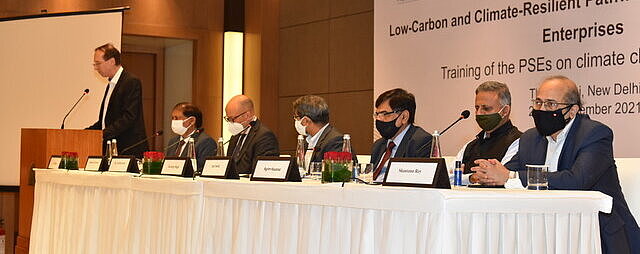September 2021 - The Global Climate Risk Index 2021 ranks India among the top 10 countries most vulnerable to climate change. India is already experiencing severe impacts from climate change and these are projected to increase in the future. In light of this threat, the Indian government is implementing several measures to reduce its GHG emissions and adapt to climate change. One of the major steps needed to achieve those goals and develop the Indian economy on a low-carbon, resilient pathway is to raise awareness to climate change and identify climate actions.
India’s Public Sector Enterprises (PSEs) are key stakeholders in this process. They contribute a significant portion of India’s GDP and work in hard-to-abate sectors like oil and gas, energy, metals and minerals, and infrastructure. Therefore, it becomes imperative to quickly onboard PSEs in the low-carbon transition to help them achieve long-term results, thereby contributing to efforts to meet India’s climate targets.
Recognizing this need, the Standing Conference of Public Enterprises (SCOPE) and Deutsche Gesellschaft für Internationale Zusammenarbeit (GIZ) India signed a Memorandum of Understanding (MoU) as a part of the BMU funded Global Carbon Markets project, the aim being to work together on enhancing and building PSEs’ capacities for climate action. This includes exploring options to help PSEs adopt low-carbon technology, increase resource efficiency and enhance sustainability in their operations. SCOPE and GIZ India conducted a training needs assessment (TNA) of the PSEs to understand the level of knowledge related to climate change that the PSEs currently possess. This exercise highlighted the practices and activities that the PSEs have in place to address climate change, and also revealed their capacity building needs. The TNA involved extensive consultations with twenty PSEs, including one-on-one interviews with key officers from each organization. The TNA paved way for a comprehensive training course, with modules covering key aspects of climate change mitigation to enable PSEs to embark on a low-carbon development pathway.
On 20th September 2021, SCOPE and GIZ India organized an event to launch the TNA Report “Low Carbon and Climate Resilient Pathways for PSEs: Training and Capacity Needs Assessment”. The event was attended by prominent stakeholders, including from the Department of Public Enterprises, the Ministry of Finance, the Government of India, the German Embassy to India, and senior management from India’s largest PSEs operating in hard-to-abate sectors. The launch event was followed by the first training workshop for PSE officials from the Northern regional offices. The 2-day training workshop covered several aspects of climate change from both the global and the Indian perspective. With presentations, discussions, activities, and case study analyses, participants were introduced to global and Indian climate policy; carbon pricing mechanisms; carbon markets and associated opportunities; and climate financing. A workshop with a similar format was held in Bhubaneswar, Odisha on September 28-29 for the regional offices of public sector enterprises in the eastern region of the country. Building on this experience, two more training workshops are planned for the regional offices in the south and west in 2021.

